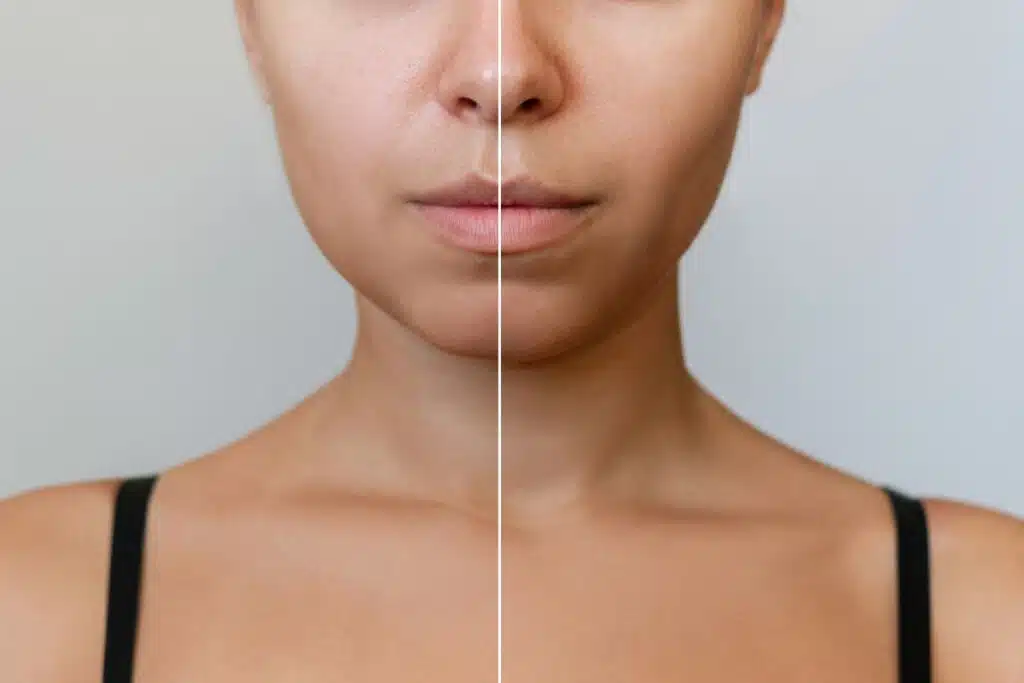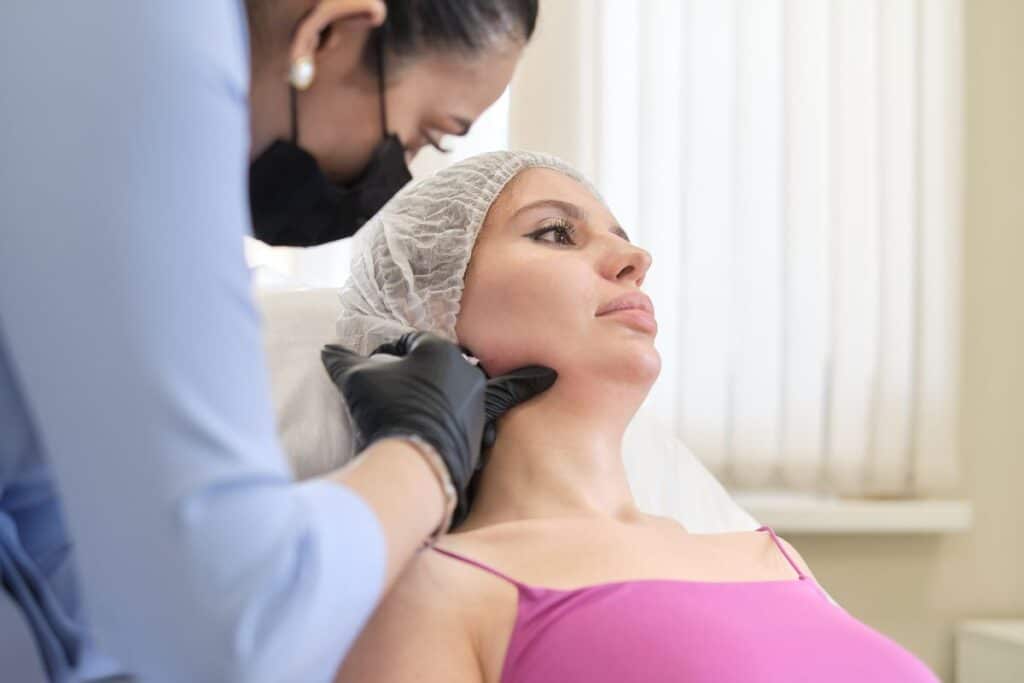Masseter Botox and buccal fat removal are popular cosmetic treatments that reshape the face, but they work in different ways. Buccal fat removal is a surgical procedure that reduces fullness in the lower cheeks by removing fat pads, creating a slimmer and more contoured look. Masseter Botox, on the other hand, involves injecting Botox into the jaw muscles to relax and shrink them, softening the jawline over time. While both treatments can enhance facial definition, one targets fat, and the other focuses on muscle size. Choosing the right option depends on your aesthetic goals and facial structure.
With specialized training in facial contouring, Dr. Kirk Lozada offers expert recommendations tailored to each patient’s needs. His experience helps patients achieve their ideal facial shape with safe and effective treatment options.

Choosing Between Cheek Contouring Options
- A buccal fat reduction is a surgical approach targeting cheek fat pads for a more defined facial contour.
- Masseter Botox is a non-surgical procedure that releases jaw muscles often helping to reduce the appearance of a broad jaw.
- Masseter’s Botox needs numerous treatments to maintain the effect; buccal fat removal produces long-lasting effects.
- Masseter Botox often has little downtime, whereas recovery following buccal fat removal often consists of a few weeks of edema.
- The guidance of a qualified aesthetic surgeon will assist you in choosing the optimal course of action depending on your desired result and facial shape.
Purpose, Benefits and Treatment Goals

Buccal Fat Removal
Buccal fat removal is a cosmetic procedure designed to reduce fullness in the cheeks, giving the face a more contoured and sculpted look. By removing excess buccal fat pads, this treatment enhances facial balance and symmetry, creating a slimmer and more defined appearance. It’s an excellent option for those who feel their cheeks look too round or chubby and want a more structured, refined look.

Masseter Botox
Masseter Botox is a non-surgical treatment that helps slim and refine the jawline by relaxing the masseter muscles (the muscles responsible for chewing). This is ideal for individuals with a square or overly prominent jawline due to muscle hypertrophy. The Botox injections gradually soften the lower face, creating a more elegant and tapered look.
Both buccal fat removal and Masseter Botox are effective facial contouring treatments, but they work in different areas. Buccal fat removal refines the cheeks, while Masseter Botox slims the jawline. Together or separately, they can enhance facial harmony and help you achieve your ideal look.
FIND THE RIGHT FACE CONTOURING TREATMENT FOR YOU
Discover whether Buccal Fat Removal or Masseter Botox is the best fit for your facial goals.
Risks and Potential Side Effects
Masseter Botox and buccal fat removal are safe procedures, but there are possible side effects. Patients should be aware of the risks involved before undergoing these procedures.
Risks with Buccal Fat Removal
This procedure can lead to:
- Infection around the incision point
- Severe bleeding
- Asymmetrical facial shapes
- Damage to face nerves, possibly leading to asymmetry or muscular weakness
Side Effects of Masseter Botox injection
Botox can result in:
- Temporary bruising at the injection site
- Headaches
- Challenges with chewing or speaking, typically brief
Monitoring and communication with your plastic surgeon is crucial following masseter treatments to address any side effects promptly.
Downtime and Recovery Period
Recovery After Buccal Fat Removal
Post-buccal fat removal, patients may need several days up to a week of recovery. During this time, buccal fat removal incisions heal, and swelling decreases. It is advised to rest and keep facial movements to a minimum to facilitate healing.
Resuming Activities Post-Masseter Botox
As a non-surgical cosmetic treatment, Masseter Botox calls for either minimal to no downtime. Usually, patients can start regular activities right after the treatment. Unlike surgical procedures, Masseter Botox doesn’t involve a long recovery period. Most people go back to their daily routines right away.
Philadelphia’s Premier Double Board Certified Facial Plastic Surgeon & Rhinoplasty Specialist.
Dr. Lozada is a facial sculpting expert who can help you achieve your desired aesthetic results.

Post-Treatment Care
Following these post-treatment care guidelines helps both treatments to aid in healing and produce good results.
Remove buccal fat, then follow these guidelines for a good recovery period:
- Normal swelling and soreness should go away a few days following therapy.
- Sleep with your head raised.
- To aid with swelling, gently compress your cheeks.
Masseter Botox also requires simple care:
- Do not massage or apply pressure to the treated areas at all.
- For several hours following the operation, keep your posture straight.
Results and Impact on Facial Expression and Function
Facial Mobility After Buccal Fat Removal
Buccal fat removal enhances facial contours without affecting muscle function. Since this procedure only removes fat and does not alter the muscles responsible for expressions, patients can smile, speak, and move their faces naturally. The result is a slimmer appearance without compromising facial mobility.
Chewing and Jaw Function with Masseter Botox
Masseter Botox temporarily relaxes the jaw muscles, which may cause minor, short-term changes in chewing. Some patients experience a slightly different chewing sensation or reduced jaw tightness, but these effects are usually mild. As the Botox gradually wears off, the muscles regain full function, restoring normal jaw movement while maintaining a refined jawline.
Consult with a Qualified Plastic Surgeon
If you wish reliable advice suited to your needs and are considering buccal fat removal or Botox in the Masseter muscles, schedule an appointment with Dr. Kirk Lozada. With his excellent training and dedication to tailored treatment, Dr. Lozada is competent to assist you in choosing the most suitable treatment for your goals.
Philadelphia board-certified plastic surgeon, Dr. Lozada, offers professional procedures prioritizing safety and natural results. His office is ready to assist you in your decision-making process, guaranteeing your comfort and satisfaction with the chosen treatment. For professional advice right now, visit Dr. Lozada’s clinic.